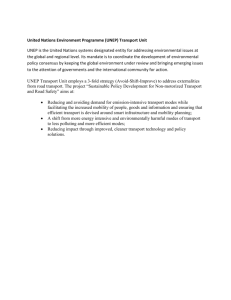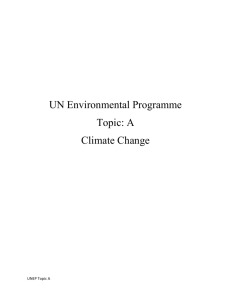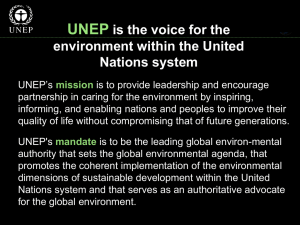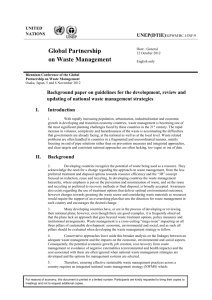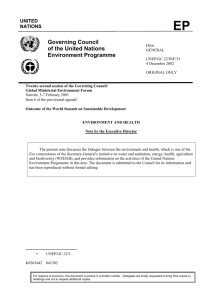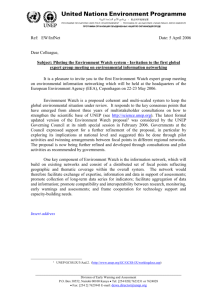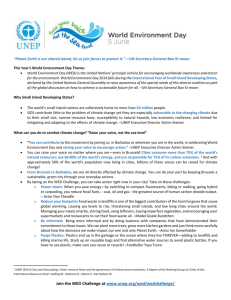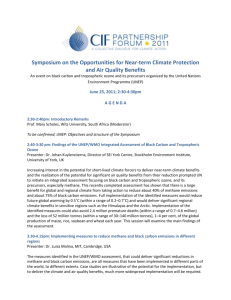Word - UNEP
advertisement
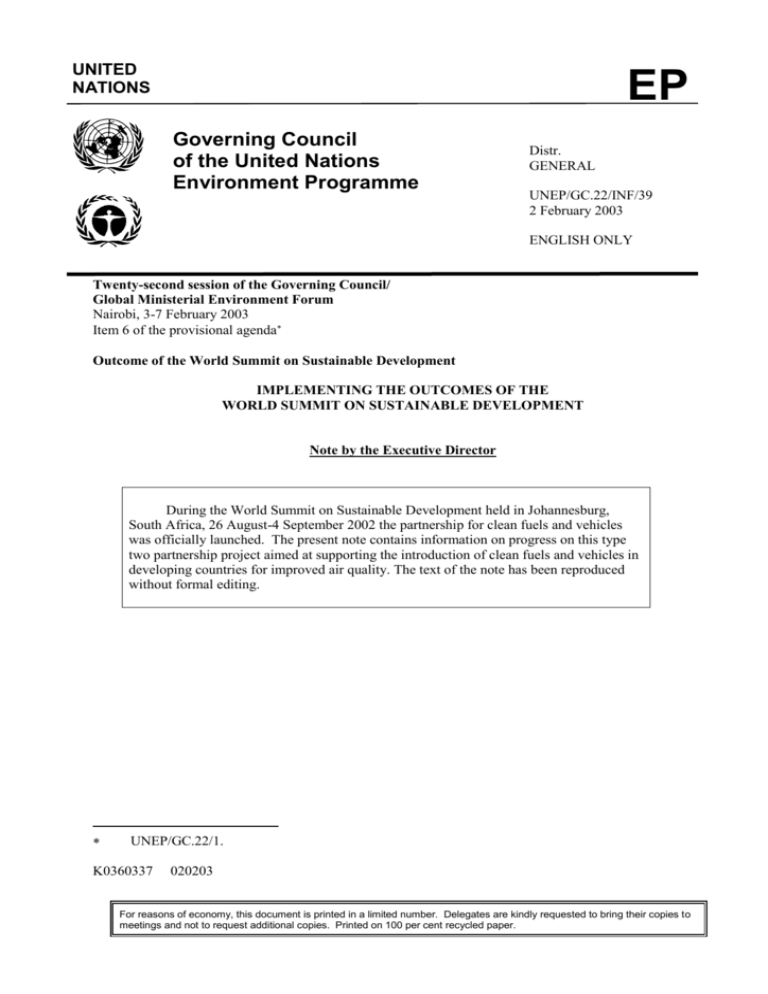
UNITED NATIONS EP Governing Council of the United Nations Environment Programme Distr. GENERAL UNEP/GC.22/INF/39 2 February 2003 ENGLISH ONLY Twenty-second session of the Governing Council/ Global Ministerial Environment Forum Nairobi, 3-7 February 2003 Item 6 of the provisional agenda Outcome of the World Summit on Sustainable Development IMPLEMENTING THE OUTCOMES OF THE WORLD SUMMIT ON SUSTAINABLE DEVELOPMENT Note by the Executive Director During the World Summit on Sustainable Development held in Johannesburg, South Africa, 26 August-4 September 2002 the partnership for clean fuels and vehicles was officially launched. The present note contains information on progress on this type two partnership project aimed at supporting the introduction of clean fuels and vehicles in developing countries for improved air quality. The text of the note has been reproduced without formal editing. UNEP/GC.22/1. K0360337 020203 For reasons of economy, this document is printed in a limited number. Delegates are kindly requested to bring their copies to meetings and not to request additional copies. Printed on 100 per cent recycled paper. UNEP/GC.22/INF/39 Implementing the Outcomes of the World Summit on Sustainable Development (WSSD) A Leading Type II Project: the Partnership for Clean Fuels and Vehicles 1. The Partnership for Clean Fuels and Vehicles as an outcome of the WSSD On 29 August 2002, during the World Summit on Sustainable Development (WSSD), the Partnership for Clean Fuels and Vehicles was officially launched. The Partnership is a so-called Type II project; projects that are jointly implemented by governments, the private sector, civil society and international organisations. The Partnership for Clean Fuels and Vehicles is aiming at supporting the introduction of clean fuels and vehicles in developing countries for improved air quality. UNEP is one of the key players in the implementation of this Partnership. This document gives a brief overview of the Partnership, the progress made since it was launched, and UNEP’s role. At present the Partnership is among the leading WSSD partnerships with regard to progress and implementation. 2. Background Urban air pollution is increasingly impacting negatively on the environment and on the health of urban citizens. In addition, urban air pollution is a major contributor to regional and global environmental issues such as transboundary air pollution and climate change. In general, transport is the main contributor to air pollution in developing country cities. The key problems are the use of leaded gasoline and high concentrations of sulfur in fuels. Other issues are the introduction of clean vehicle technologies in developing countries, such as catalytic converters. Catalytic converters have been introduced in developed countries, reducing air pollution by more than 90 percent. The situation in developing countries is in sharp contrast to this, especially in Africa, where leaded fuel continues to be used, with detrimental health effects on its urban citizens, and particularly on children. The use of leaded fuel prevents the use of catalytic converters, as these devices are not compatible with leaded fuel. Fuel sulfur levels in developing countries are very high and often more than hundred times higher than the most stringent US/ European standards. This results in many serious health effects, including respiratory illness. Air pollution has huge economic costs for developing countries. It is estimated that the costs of environmental damage in developing country cities are equivalent to 5-10 percent of urban income. Air pollution is one of the major contributors to this. 2. Objective The Partnership on Clean Fuels and Vehicles will contribute to the implementation of global mandates, such as those of the WSSD on the phase out of leaded gasoline, as well as regional and national mandates and agreements, including existing programmes in Latin America, Asia and Africa. Only with a comprehensive approach where all Partners come together and join efforts will it be possible to achieve the goals set. After the Partnership was launched at the WSSD in Johannesburg, the partners met for the first time in New York in November 2002 to discuss and develop the implementation arrangements for the Partnership. During the meeting in New York the partners decided on the following mission statement for the Partnership: 2 Help developing countries to develop action plans to complete the global elimination of leaded gasoline and start the phase down of sulfur in diesel and gasoline fuels, concurrent with adopting cleaner vehicle requirements; UNEP/GC.22/INF/39 Support the development and adoption of cleaner fuel standards and cleaner vehicle requirements by providing a platform for exchange of experiences and successful practices in developed and developing countries as well as technical assistance; Develop public outreach materials, educational programmes, and awareness campaigns; adapt economic and planning tools for clean fuels and vehicles analyses in local settings; and support the development of enforcement and compliance programs, with an initial focus on fuel adulteration; Foster key partnerships between government, industry, NGOs, and other interested parties within a country and between countries to facilitate the implementation of clean fuels and vehicles commitments. 3. Partners There is keen interest in the Partnership, and the list of partners is steadily growing. Please find the list of partners attached to this document. 4. Activities Since the creation of the Partnership at the WSSD, the following key activities have taken place. 4.1 The first meeting of the Partners The Partners met for the first time in New York, from 14 to 15 November 2002, to discuss the implementation of the Partnership as agreed during the WSSD. The Executive Director of UNEP, Dr. Klaus Töpfer, as well as Ms. JoAnne Disano, Director of the Division for Sustainable Development at the UN Department of Economic and Social Affairs (UN DESA) participated in the meeting. The meeting was very well attended. The Partners adopted the mission statement of the Partnership, and requested UNEP to set up a Clearing House at its Headquarters in Nairobi to support the Partners in the implementation of the Partnership. In addition three global working groups were established on key issues. 4.2 Establishment of the Clearing House for the Partnership in UNEP As requested, UNEP is in the process of setting up the Clearing House. The partners assigned the following tasks to the Clearing House: Share and disseminate information to the partners on relevant issues; Operate and maintain a web-site to provide easy access to information, partner activities, and resources; Provide logistics for partnership activities and events: workshops, technical assistance activities, etc; Provide administrative help to partners; Establish and maintain contacts in developing countries; Help to gather appropriate information for countries; Liaise with the other existing groups working on related activities; Help to bring in new partners or participants in partnership activities; Develop and disseminate public outreach materials about the partnership, along with technical materials for the developing countries; Help to bring developing country NGOs, universities, and governments into the partnership or its activities; and Support partners, at their request, in addressing these. Several Partners have provided funding for the Clearing House, including the Canadian Government, The Netherlands Government, the International Petrol Industry Environmental Conservation Association (IPIECA) and UNEP. Additional partners have made pledges for support, including the United States Environmental Protection Agency (USEPA) and the International Fuel Quality Centre (IFQC). The Clearing House will be operational as of February 2003. 4.3 Partnership Working Groups During the meeting in New York, the Partners decided to establish three working groups to advice and assist developing countries on specific issues related to fuels and vehicles. The working groups will provide 3 UNEP/GC.22/INF/39 general information material for use by Governments and other partners to promote clean fuels and vehicles on octane, sulfur and valve seat recession. 4.4 Regional Activities The Partnership is aimed at bringing partners together to ensure that initiatives are coordinated. Many partners are already active at the regional, sub-regional, and national levels in support of the fuels and vehicles issues. During the New York meeting, an overview was presented per region on ongoing projects. This has resulted in partners now jointly working together on these issues in the regions. 4.5 Activities of UNEP Immediately after the New York meeting UNEP took the necessary steps to establish the Clearing House. UNEP has raised funds and recruited a full time staff member for the Clearing House. UNEP will continue its efforts to develop and support initiatives with Partners within the regions and sub-regions, with a specific focus on Africa. UNEP participated in the development of the Dakar Declaration (June 2001) that sets the end of 2005 as the date for the complete phase out of leaded gasoline in Africa. In support of the Dakar Declaration, UNEP organized, in close cooperation with IPIECA, USEPA and the World Bank, a subregional workshop for the Phase out of Leaded Gasoline in East Africa in June 2002. UNEP is currently providing support to countries in the sub-region for the implementation of the action plan that was developed at the Nairobi workshop1. For 2003, UNEP is planning to organize, in close cooperation with other Partners, a sub-regional workshop for SADC (South African Development Community) to develop action plans for the SADC countries that have not already initiated action to phase out leaded gasoline. The Mali Government has also asked UNEP to work together on this issue, and an expert group meeting as well as a ministerial meeting have been proposed for 2003 with the aim of reviewing the progress made in the phase out of leaded gasoline in Africa, in particular, in light of the goals sets in the WSSD Plan of Implementation and in the Dakar Declaration. 1 4 See www.unep.org/dpdl/urbanenvironment/workshop UNEP/GC.22/INF/39 Annex: List of Partners Governments: Australia, Canada, Chile, China, European Parliament, Italy, the Netherlands Ministry of Housing, China, South Africa, United States of America Intergovernmental organizations: Asian Development Bank, Pan American Health Organization (Clean Air Initiative Asia) United Nations Department of Economic & Social Affairs (DESA), United Nations Environment Program (UNEP), World Bank Major groups: Alliance to End Childhood Lead Poisoning Environmental and Energy Technology and Policy Institute Environmental Justice Networking Forum Global Environment and Technology Foundation Health Effects Institute Legal Resources Centre, Cape Town Natural Resources Defence Council Industry: Alliance of Automobile Manufacturers American Honda American Petroleum Institute Asian Clean Fuels Association Association of European Automobile Manufacturers (AECA) Association for Emission Control by Catalyst Association of Intl. Automobile Manufacturers BP Products North America Inc. Engine Manufacturers Association ExxonMobil Refining & Supply Co. Ethyl Ford Motor Company International Fuel Quality Center (IFQC) International Petroleum Industry Environmental Conservation Assn (IPIECA) International Truck and Engine Japan Automobile Manufacturer's Association Japan Automobile Research Institute Lubrizol Corporation Manufacturers of Emission Control Association (MECA) Petrobras Society of Indian Automobile Manufacturers Volvo Group North America, Inc. ----- 5
